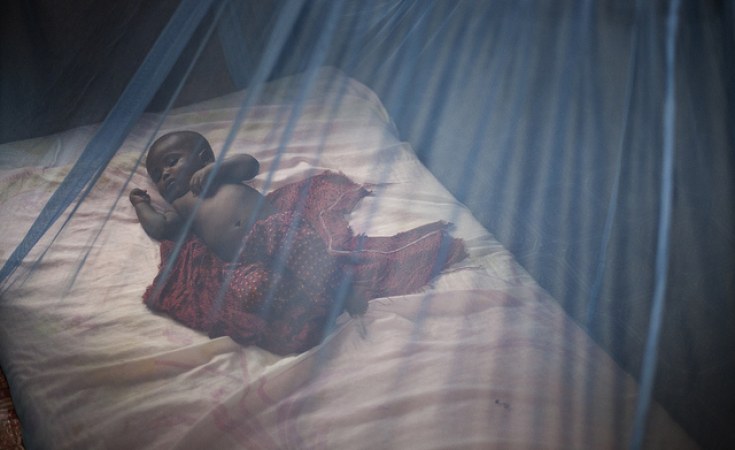Washington, DC — Despite an increase in the number of people at risk for malaria, mortality rates have dropped dramatically since 2000 through the use of a handful of tools that global health advocates hope to supplement with a vaccine that will put the world further on the road to eradicating the deadly disease.
Malaria mortality rates have dropped by 45 percent globally and by 49 percent in Africa over the past 13 years, exceeding expectations. Most of the 3.3 million people saved have been children, according to the World Malaria Report 2013 that was released by the World Health Organisation (WHO) on Wednesday.
Nearly 70 percent of those lives saved were in the 10 countries with the highest malaria burden – most of them in Africa, said Dr. Robert Newman, director of WHO's Global Malaria Programme, at the National Press Club in Washington, DC.
"The concept of 3.3 million can be a bit numbing," Newman said. "But if you think of that 3.3 million as made up of one life, plus one life, plus one life that's been saved, that's three million sets of parents that aren't grieving for a lost child. That's an amazing thing."
With strong global support and new scientific advances - including the world's first anti-malaria vaccine - there is renewed hope that malaria can not only be contained, but eliminated, Newman said.
Still, there is no silver bullet for eradication, he said. Rather it's the multi-pronged approach that has been largely responsible for the dramatic drop in deaths, malaria experts said.
The most effective tools include use of insecticide-treated bed nets, indoor residual spraying of insecticide to kill malaria-transmitting mosquitoes, availability of cheep, user-friendly rapid diagnostic tests and better access to WHO-recommended antimalaria drugs known as artemisinin-based combination therapies (ACTs).
Victims of Success
Newman said in sub-Saharan Africa, at least 51 percent of households own at least one insecticide-treated bed net, but that was far short of the international health community's universal coverage goals.
He also noted that emerging parasite resistance to artemisinin, the core component of antimalarial medications, had been detected in southeast Asia. Additionally, there has been mosquito resistance to insecticides in at least 64 countries, including some in Africa.
But, he said, malaria control has another, greater foe.
"The greatest threat to continued success of malaria control isn't biological," Newman said. "It's financial. We have less than half of the 5.1 billion dollars a year that we need to control this disease."
In the past, malaria programs have frequently been "victims of their own success," Newman said. As infection rates went down, governments reduced funding for anti-malaria programs—but the disease can roar back to life without constant vigilance.
One side effect: the children who grew up sleeping under bed nets who are suddenly left without anti-malaria support are even more vulnerable, because they haven't build up any resistance to the disease.
"We always worry that when we trumpet the success we've had, that we could undermine investment in new tools," Newman said. "This [WHO] report shows that the control efforts work, that we can dramatically reduce malaria, but we don't have enough resources to assure universal access for everyone and that's a tragedy."
Everyone's Problem
Despite progress in fighting the disease, there are still 270 million cases worldwide of malaria and 627,000 estimated deaths, according to WHO. It is currently developing a global technical strategy for malaria control and elimination for the 2016-2025 period.
But controlling malaria isn't only about saving lives, said Joy Phumaphi, executive secretary of the African Leaders Malaria Alliance at WHO and former minister of health of Botswana. It also drives development and reduces poverty worldwide, she said.
"We need to appreciate that for so long as we have an outbreak of malaria existing on the African continent, it's going to affect the ability of those economies to be effective partners for Asia and the U.S. and for Europe," Phumaphi said. "Everybody needs a market. If these economies in Africa are crippled, they will never be a viable market."
Despite the stereotype as a "poor person's disease," malaria impacts people of every walk of life in malarial countries, Phumaphi said. Sickness reduces productivity and hurts the affected country's economy - as well as the economies of its business partners.
"The well-being of everyone affects you, whether you like it or not," Phumaphi said. "Economically it does, socially it does, politically it does... This is why, in the end, elimination is so important."


